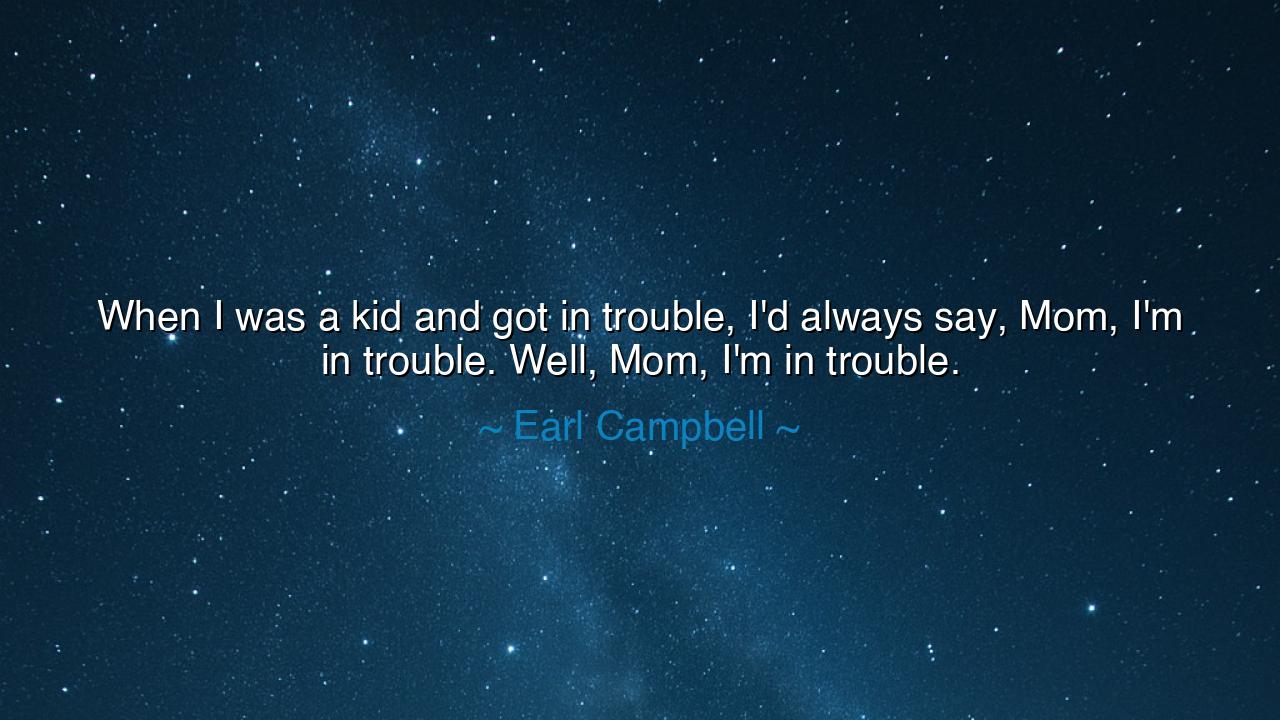
When I was a kid and got in trouble, I'd always say, Mom, I'm in
When I was a kid and got in trouble, I'd always say, Mom, I'm in trouble. Well, Mom, I'm in trouble.






The words of Earl Campbell, “When I was a kid and got in trouble, I'd always say, Mom, I'm in trouble. Well, Mom, I'm in trouble,” resonate with both simplicity and eternal truth. They reveal the timeless bond between a child and a mother, that instinctive cry for refuge when the weight of the world grows too heavy. In his words, there is no pretense of strength, no shield of pride—only the raw honesty of the soul turning back to its first protector. It is the acknowledgment that, even in adulthood and renown, the heart still remembers where it first found safety.
The origin of this sentiment lies in Campbell’s own life. Known as one of the fiercest running backs in the history of American football, he bore the image of strength, endurance, and courage on the field. Yet beneath the armor of greatness lay the memory of boyhood, when the trials of life could be softened by running to his mother with those simple words: “Mom, I’m in trouble.” By recalling this, Campbell reveals that no matter how mighty one becomes, the voice of the child within still longs for the comfort of home, the wisdom of the mother, the embrace of unconditional love.
This truth finds echoes throughout history. Consider Alexander the Great, whose conquests shook the world, yet who carried with him the fierce and guiding presence of his mother, Olympias. In letters and in memory, her voice shaped his destiny, offering counsel and grounding even as he stretched his empire across continents. The great conqueror, like Campbell, never fully outgrew the bond of the child who once sought his mother’s guidance. To confess “I’m in trouble” is not weakness—it is the recognition of the enduring human need for connection, counsel, and love.
The sadness within Campbell’s words comes from the shift of time, for in his later years he faced struggles far from the glories of the football field: physical pain, health challenges, and the burdens of fame. In such moments, he returned not to the roar of the crowd, but to the memory of his mother’s presence. It is a reminder that when worldly accolades fade and the body begins to falter, the soul reaches for its most enduring refuge: the love that first held it.
And yet, his words also carry strength. For to admit trouble is not defeat—it is the beginning of healing. Many men and women collapse under the weight of pride, unwilling to confess weakness, unwilling to speak the simple words, “I need help.” Campbell, by echoing the cry of his youth, teaches us that honesty is the greater courage. To reach out, to confess, to say “I am in trouble,” is to open the door for others to come with aid, wisdom, and comfort.
The lesson here is clear: do not be ashamed to confess your troubles. Just as a child runs to a parent, so too should we learn to reach for help when life overwhelms us. To share our burdens is to lighten them. Whether it is to family, to friends, to mentors, or to the divine, we must not lock away our cries for help. For strength is not only in endurance—it is in vulnerability, in the willingness to admit that we are human.
Practically, this means cultivating honesty in our lives. Speak openly with those you trust; teach children that they need not hide their struggles; create communities where people can say, without shame, “I’m in trouble.” In so doing, we keep alive the ancient wisdom that healing begins with confession, and strength begins with trust.
Thus, Earl Campbell’s words become more than a memory of childhood. They are a teaching: greatness is not found in pretending to be invulnerable, but in knowing when to say, “I need help.” And in that humble confession, we rediscover the love, the guidance, and the strength that first carried us when we were young.






AAdministratorAdministrator
Welcome, honored guests. Please leave a comment, we will respond soon